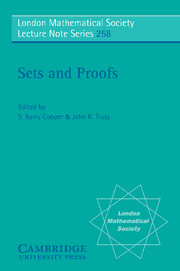Book contents
- Frontmatter
- Contents
- Preface
- An Introduction To Finitary Analyses Of Proof Figures
- What Mathematical Truth Could Not Be – II
- Proof Search in Constructive Logics
- David's Trick
- A Semantical Calculus for Intuitionistic Propositional Logic
- An Iteration Model Violating the Singular Cardinals Hypothesis
- An Introduction to Core Model Theory
- Games of Countable Length
- On the Complexity of the Propositional Calculus
- The Realm of Orinal Analysis
- Covering Properties of Core Models
- Ordinal Systems
- Polish Group Topologies
- Forcing Closed Unbounded Subsets of Nw+1
- First Steps into Metapredicativity in Explicit Mathematics
- What Makes A (Pointwise) Subrecursive Hierarchy Slow Growing?
- Minimality Arguments for Infinite Time Turing Degrees
Preface
Published online by Cambridge University Press: 05 September 2013
- Frontmatter
- Contents
- Preface
- An Introduction To Finitary Analyses Of Proof Figures
- What Mathematical Truth Could Not Be – II
- Proof Search in Constructive Logics
- David's Trick
- A Semantical Calculus for Intuitionistic Propositional Logic
- An Iteration Model Violating the Singular Cardinals Hypothesis
- An Introduction to Core Model Theory
- Games of Countable Length
- On the Complexity of the Propositional Calculus
- The Realm of Orinal Analysis
- Covering Properties of Core Models
- Ordinal Systems
- Polish Group Topologies
- Forcing Closed Unbounded Subsets of Nw+1
- First Steps into Metapredicativity in Explicit Mathematics
- What Makes A (Pointwise) Subrecursive Hierarchy Slow Growing?
- Minimality Arguments for Infinite Time Turing Degrees
Summary
Basic science, and within that pure mathematics, has a unique ability to surprise and change our view of the world we live in. But more often than not, its fundamental ‘relevance’ has emerged in ways impossible to have anticipated. As has often been remarked, that of the best basic science (say of non-Euclidean geometry, or of Hilbert spaces, or of the universal Turing machine) is independent of limited views of potential applicability.
Logic Colloquium '97, held in Leeds, England, 6th – 13th July, 1997, set out to reflect all that was best in contemporary logic, and Models and Computability and Sets and Proofs comprise two volumes of refereed articles, mainly based on the invited talks given at that meeting. Thanks to the programme committee (its other members being George Boolos, Sam Buss, Wilfrid Hodges, Martin Hyland, Alistair Lachlan, Alain Louveau, Yiannis Moschovakis, Leszeck Pacholski, Helmut Schwichtenberg, Ted Slaman and Hugh Woodin) and the special sessions organisers (Klaus Ambos-Spies, Sy Friedman, Wilfrid Hodges, Gerhard Jaeger, Steffen Lempp, Anand Pillay and Helmut Schwichtenberg), the editors have been able to call on a rich and distinguished array of authors. It is of great regret that one of our programme committee members was not able to see the success to which he had substantially contributed, and the British Logic Colloquium Lecture, given by Paul Benacerraf, took the form of a tribute to his memory.
- Type
- Chapter
- Information
- Sets and Proofs , pp. vii - xPublisher: Cambridge University PressPrint publication year: 1999

